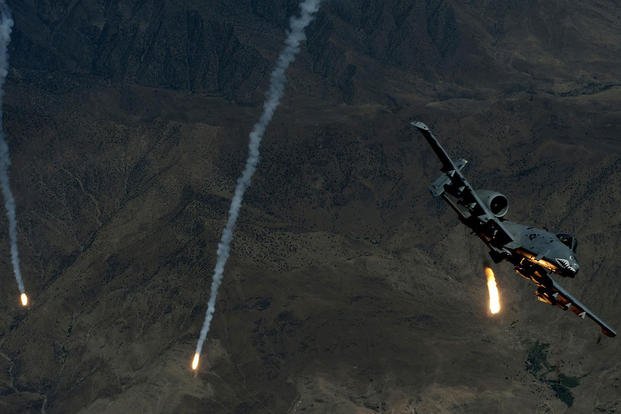The U.S. military denied Thursday Moscow's charges that A-10 Thunderbolt attack aircraft hit Aleppo, where Syrian regime forces backed by Russian airstrikes have triggered a humanitarian crisis.
"There were no Coalition airstrikes in or near Aleppo on Wednesday. Any claim that the coalition had aircraft in the area is a fabrication," Army Col. Steve Warren, a spokesman for Combined Joint task Force-Operation Inherent Resolve, said in an e-mail statement.
In a later e-mail statement from Baghdad, Warren said that the only U.S. airstrikes ever carried out near Aleppo were in the beginning of the U.S. air campaign in August 2014 and were aimed at the Khorasan group, an Al Qaeda affiliate operating in Syria.
The Russian charges came a day after Warren gave a video briefing to the Pentagon in which he railed against the indiscriminate airstrikes using "dumb bombs" carried out in and around Aleppo by Russian warplanes to support the forces of the regime of Syrian President Bashar al-Assad.
Warren singled out Russian strikes that he said hit two hospitals Wednesday, depriving an estimated 50,000 civilians of medical care.
In Moscow, Defense Ministry spokesman Igor Konashenkov said in a statement that "only aviation of the anti-ISIS coalition flew over the city yesterday (Wednesday)", referring to the U.S.-led alliance of countries fighting the Islamic State terror group.
"Two U.S. Air Force A-10 attack aircraft entered Syrian airspace from Turkish territory. Reaching Aleppo by the most direct path, they made strikes against objects in the city," Kornashenkov said.
The Russian charges came as Defense Secretary Ashton Carter met in Brussels with allied defense ministers to discuss accelerating the campaign against ISIS in Iraq and Syria. Carter said that NATO itself may soon become part of the coalition against ISIS.
"Thanks to the leadership of NATO (Secretary General) Jens Stoltenberg, we are exploring the possibility of NATO joining the coalition as a member itself," Carter said after a round of meetings.
Several NATO member states are already part of the anti-ISIS coalition, but having the alliance itself on board would be a "significant development," Carter said. NATO has long been part of the U.S.-led coalition in Afghanistan.
"NATO as a new member would bring unique capabilities," Carter said, "including experience in building partner capacity, training ground forces and providing stabilization support. I look forward to discussing NATO's appropriate role with fellow NATO allies in the days and weeks ahead."
Earlier Thursday, Stoltenberg said that NATO had agreed in principle to a plan to use the alliance's fleet of E-3A Boeing Sentry AWACS (Airborne Warning and Control Systems) aircraft to substitute for missions now flown by U.S. AWACS. The move would free up U.S. AWACS for surveillance missions over Iraq and Syria.
"We are looking at how we can step up our support," Stoltenberg said. "We will provide AWACS which will increase capabilities for the coalition to fight ISIL (another acronym for ISIS) and we will, of course, assess constantly if we should do more."
Stoltenberg also said NATO had agreed to send its Standing Maritime Group 2 of three warships to the Aegean Sea to monitor the flow of migrants fleeing Syria as part of a plan put forth by Greece, Turkey and Germany.
Air Force Gen. Philip Breedlove, the Supreme Commander of NATO and also commander of U.S. European Command, said several other nations were ready to contribute ships to the NATO monitoring naval group.
Without naming them, Breedlove said "several of our very high-end, very capable nations" were ready to make contributions to the naval group "and this will be required to sustain this mission and to get the right kind of capabilities into the area. Picking up small, sometimes non-metallic boats in an ocean is hard work."
-- Richard Sisk can be reached at richard.sisk@military.com





























